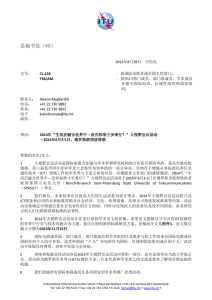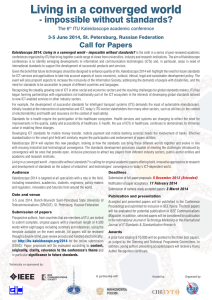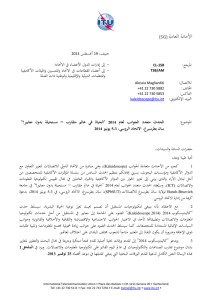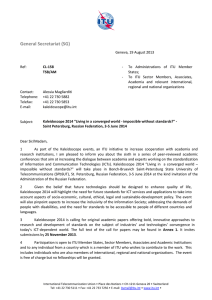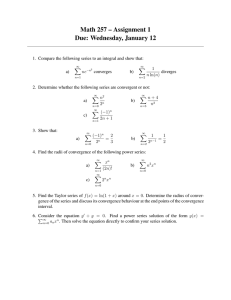Генеральный секретариат (ГС)
advertisement
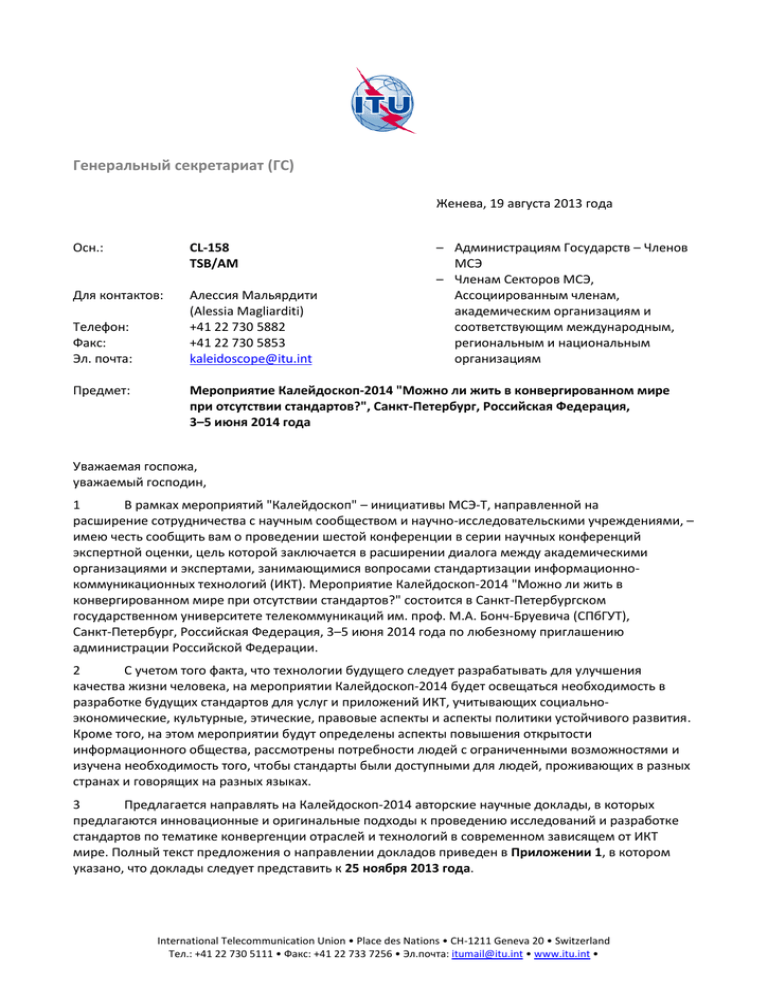
Генеральный секретариат (ГС) Женева, 19 августа 2013 года Осн.: CL-158 TSB/AM Для контактов: Алессия Мальярдити (Alessia Magliarditi) +41 22 730 5882 +41 22 730 5853 kaleidoscope@itu.int Телефон: Факс: Эл. почта: Предмет: – Администрациям Государств – Членов МСЭ – Членам Секторов МСЭ, Ассоциированным членам, академическим организациям и соответствующим международным, региональным и национальным организациям Мероприятие Калейдоскоп-2014 "Можно ли жить в конвергированном мире при отсутствии стандартов?", Санкт-Петербург, Российская Федерация, 3–5 июня 2014 года Уважаемая госпожа, уважаемый господин, 1 В рамках мероприятий "Калейдоскоп" – инициативы МСЭ-Т, направленной на расширение сотрудничества с научным сообществом и научно-исследовательскими учреждениями, – имею честь сообщить вам о проведении шестой конференции в серии научных конференций экспертной оценки, цель которой заключается в расширении диалога между академическими организациями и экспертами, занимающимися вопросами стандартизации информационнокоммуникационных технологий (ИКТ). Мероприятие Калейдоскоп-2014 "Можно ли жить в конвергированном мире при отсутствии стандартов?" состоится в Санкт-Петербургском государственном университете телекоммуникаций им. проф. М.А. Бонч-Бруевича (СПбГУТ), Санкт-Петербург, Российская Федерация, 3–5 июня 2014 года по любезному приглашению администрации Российской Федерации. 2 С учетом того факта, что технологии будущего следует разрабатывать для улучшения качества жизни человека, на мероприятии Калейдоскоп-2014 будет освещаться необходимость в разработке будущих стандартов для услуг и приложений ИКТ, учитывающих социальноэкономические, культурные, этические, правовые аспекты и аспекты политики устойчивого развития. Кроме того, на этом мероприятии будут определены аспекты повышения открытости информационного общества, рассмотрены потребности людей с ограниченными возможностями и изучена необходимость того, чтобы стандарты были доступными для людей, проживающих в разных странах и говорящих на разных языках. 3 Предлагается направлять на Калейдоскоп-2014 авторские научные доклады, в которых предлагаются инновационные и оригинальные подходы к проведению исследований и разработке стандартов по тематике конвергенции отраслей и технологий в современном зависящем от ИКТ мире. Полный текст предложения о направлении докладов приведен в Приложении 1, в котором указано, что доклады следует представить к 25 ноября 2013 года. International Telecommunication Union • Place des Nations • CH-1211 Geneva 20 • Switzerland Тел.: +41 22 730 5111 • Факс: +41 22 733 7256 • Эл.почта: itumail@itu.int • www.itu.int • -2- 4 Участвовать в мероприятии и представлять доклады могут Государства – Члены МСЭ, Члены Секторов, Ассоциированные члены и академические организации, а также любое лицо из страны, являющейся Членом МСЭ, которое пожелает внести свой вклад в работу. К таким лицам относятся также члены международных, региональных и национальных организаций. Участие в мероприятии является бесплатным, но стипендии не предоставляются. 5 Наряду с лекционными и стендовыми сессиями, составляющими программу Калейдоскопа-2014, состоится выставка местного университета. Это мероприятие предоставит возможность обмена идеями и информацией о выполняемых в научных кругах России проектах между представителями отрасли, являющимися экспертами в области стандартизации ИКТ, и академическими организациями. 6 Мы призываем всех Членов МСЭ осуществить распространение информации об этих мероприятиях в научном сообществе своей страны. 7 Подробная информация относительно регистрации и материально-технического обеспечения будет размещена на веб-странице мероприятия по адресу: http://www.itu-kaleidoscope.org/2014 ближе к периоду проведения конференции. Обращаем внимание на то, что предварительная регистрация участников семинаров-практикумов проводится только в онлайновом режиме. 8 Хотели бы напомнить о том, что для въезда в Российскую Федерацию и пребывания в ней в течение любого срока гражданам некоторых стран необходимо получить визу. В таком случае визу следует запрашивать и получать в учреждении (посольстве или консульстве), представляющем Российскую Федерацию в вашей стране или, если в вашей стране такое учреждение отсутствует, в ближайшем к стране выезда. Участникам, которым необходимо содействие принимающей стороны в получении въездной визы, предлагаем ознакомиться с информацией, представленной на вебстранице мероприятия "Калейдоскоп" по адресу: http://www.itu-kaleidoscope.org/2014. Информация будет размещаться по мере поступления. С уважением, [подпись] Д-р Хамадун И. Туре Генеральный секретарь Приложение: 1 -3- ANNEX 1 (to Circular 158) Living in a converged world – impossible without standards? The 6th ITU Kaleidoscope academic conference 3-5 June 2014, St. Petersburg, Russian Federation Call for Papers Kaleidoscope 2014: Living in a converged world - impossible without standards? is the sixth in a series of peer-reviewed academic conferences organized by ITU that bring together a wide range of views from universities, industry and research institutions. The aim of Kaleidoscope conferences is to identify emerging developments in information and communication technologies (ICTs) and, in particular, areas in need of international standards to support the development of successful products and services. Given the belief that future technologies should be designed to enhance quality of life, Kaleidoscope 2014 will highlight the need for future standards for ICT services and applications to take into account aspects of socio-economic, cultural, ethical, legal and sustainable-development policy. The event will also pinpoint aspects to increase the inclusivity of the Information Society; addressing the demands of people with disabilities, and the need for standards to be accessible to people of different countries and languages. Recognizing the steadily growing role of ICT in other social and economic sectors and the resulting challenges for global standards makers, ITU has begun forming partnerships with organizations not traditionally part of the ICT ecosystem in the interests of developing global standards tailored to new ICTenabled services in other industry sectors. For example, the development of successful standards for intelligent transport systems (ITS) demands the input of automobile manufacturers. Initially located at the intersection of automotive and ICT, today’s ITS involve stakeholders from many other sectors, such as utilities (in the context of electromobility) and health and insurance (in the context of road safety). Standards for e-health require the participation of the healthcare ecosystem. Health services and systems are changing to reflect the need for improvements in the quality, safety and accessibility of healthcare. Ehealth, the use of ICTs in healthcare, continues to demonstrate its immense value in enabling these changes. Developing ICT standards for mobile money transfer, mobile payment and mobile banking services needs the involvement of banks. Effective standardization in the smart grid field will similarly require the participation and endorsement of power utilities. Kaleidoscope 2014 will explore this new paradigm, looking at how the standards can bring these different worlds together and evolve in line with ensuing industrial and technological convergence. The standards development processes capable of meeting the challenges introduced by convergence will be ones that provide open, inclusive processes to attract key players from different industry sectors, public-sector entities and academic and research institutes. Living in a converged world - impossible without standards? is calling for original academic papers offering bold, innovative approaches to research and development of standards on the subject of industries’ and technologies’ convergence in today’s ICT-dependent world. Audience Kaleidoscope 2014 is targeted at all specialists with a role in the field, including researchers, academics, students, engineers, policy-makers and regulators, innovators and futurists from around the world. -4- Date and venue 3-5 June 2014, Bonch-Bruevich Saint-Petersburg State University of Telecommunications (SPbSUT), St. Petersburg, Russian Federation Submission of papers Prospective authors, from countries that are members of ITU, are invited to submit complete, original papers with a maximum length of 4,500 words within eight pages including summary and references, using the template available on the event website. All papers will be reviewed through a double-blind, peerreview process and handled electronically; see http://itu-kaleidoscope.org/2014 for the online submission (EDAS). Paper proposals will be evaluated according to content, originality, clarity, relevance to the conference’s theme and in particular significance to future standards. Deadlines Submission of full paper proposals: 25 November 2013 Notification of paper acceptance: 17 February 2014 Submission of camera-ready accepted papers: 3 March 2014 Publication and presentation Accepted papers will be presented during the event and published in the proceedings and in IEEE Xplore. The best papers will be evaluated for potential publication in IEEE Communications Magazine. In addition, selected papers will be considered for publication in the International Journal of Technology Marketing or the International Journal of IT Standards & Standardization Research. Awards A prize fund totaling $10,000 will be granted to the three best papers, as judged by the Steering and Technical Programme Committees. In addition, young authors presenting accepted papers will receive a Young Author Recognition certificate. Keywords Information and communication technologies (ICTs), converging technologies, human-oriented technologies, technological innovation, standardization, radio spectrum, ambient intelligence, smart grid, mobile banking services, ubiquitous networks, internet of things, M2M, e-applications, information society, ethics, sustainability. Suggested (non-exclusive) list of topics Track 1: Technology and architecture evolution in a converged world Billing and charging for converging services Business process management and optimization in convergent networks Communications for smart grid Cooperation and convergence of networks End-to-end quality of service support Enterprise integration and service-oriented architecture Environmental and biometric actuators and sensors in convergent services Human-centric, cognitive and context-aware systems Machine-to-machine communication, Internet of Things, and Internet of Everything Mobility and nomadicity Monitoring, tracking convergence system Nanonetworks Near-field communications (personal area network, body area network, etc.) Network convergence (heterogenious network system) Network functions virtualization and software defined networks Network support for converging services New transmission network systems (terabit, petabit, exabit) Optical wireless convergence system (LD-LED optical device convergence) -5- Pervasive and trusted network and service infrastructure Protocol architecture convergence and interoperability Security and privacy-enhancing technologies Vehicle and infrastructure convergence Virtual and real network convergence Wireless sensor networks Track 2: ICT applications and services for converging worlds Accessibility - ageing and ambient assistive living Augmented reality and technology intelligence Autonomous vehicles and vehicle communications E-agriculture E-learning and e-science Energy efficiency/use cases of smart grid Home entertainment hubs Innovative applications and content delivery (IPTV, games, etc.) Location-based services Mobile banking services: mobile payments and mobile money transfer Mobile robots New models for health-care (e-health, m-health, tele-health, telemedicine, etc.) Service convergence Service layer requirements Smart cities: utilities, transport, buildings and homes Social networking services and convergence Television and video services (3D video image communication) XaaS (Anything as a Service) Track 3: Social, economic and policy aspects of ICT for converging worlds Accessibility and usability Business models (including accounting, billing and charging) Crowdsourcing and service convergence Deployment of smart grids in developing countries Digital journalism Digital rights and identity management Education about Standardization Environmental sustainability E-government and e-democracy Ethical issues Inclusiveness, affordability and equal access Internationalization and localization Legislative and regulatory frameworks Network neutrality Regulation (for QoS, network sharing, etc.) Security, confidentiality and privacy Societal impact Stakeholder perceptions in standards Standardization and innovation management Standardization, innovation and convergence Standards in healthcare services -6- General Chairman Sergey Bachevsky (Rector, Bonch-Bruevich Saint-Petersburg State University of Telecommunications (SPbSUT), Russian Federation) Steering Committee Christoph Dosch (ITU-R Study Group 6 Chairman; IRT GmbH, Germany) Kai Jakobs (RWTH Aachen University, Germany) Mostafa Hashem Sherif (AT&T, USA) Mitsuji Matsumoto (Waseda University, Japan) Host Committee Chairman: Rashid Ismailov (Ministry of Telecom and Mass Communications, Russian Federation) Valery Butenko (Radio Research and Development Institute (NIIR), Russian Federation) Vladimir Vasiliev (St. Petersburg National Research University of Information Technologies, Mechanics and Optics (ITMO), Russian Federation) Artem Adjemov (Moscow Technical University of Communications and Informatics (MTUCI), Russian Federation) Alexey Vasiliev (Central Science Research Telecommunication Institute (ZNIIS), Russian Federation) Natalia Timofeeva (Ministry of Telecom and Mass Communications, Russian Federation) Anton Yuzhakov (Ministry of Telecom and Mass Communications, Russian Federation) Georgy Mashkov (SPbSUT, Russian Federation) Sergey Dotsenko (SPbSUT, Russian Federation) Oleg Zolotokrylin (SPbSUT, Russian Federation) Andrey Koucheryavy (SPbSUT, Russian Federation) Technical Programme Committee Chairman: Kai Jakobs (RWTH Aachen University, Germany) The Technical Programme Committee is composed of over 100 subject matter experts worldwide. Details are available at http://www.itu.int/ITU-T/uni/kaleidoscope/2014/progcom.html For additional information Additional information is available on the conference website: http://itu-kaleidoscope.org/2014. Inquiries should be addressed to kaleidoscope@itu.int ______________ M:\KALEIDOSCOPE\K-2014\LETTERS\CIRCULAR\CL158-R.DOCX (349467) 29.08.13 29.08.13

